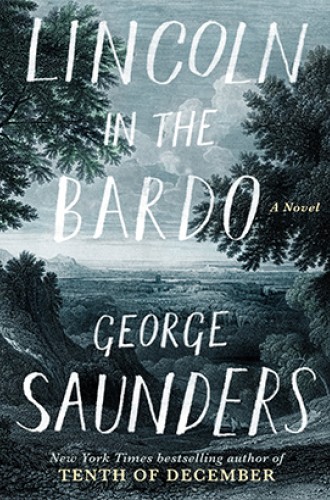A president walks into a Buddhist purgatory
The new George Saunders novel turns a crazy idea into a deeply moving story.
Who would have predicted that the biggest literary splash in recent memory—a novel judged sophisticated and funny by the New York Times, the New Yorker, and Stephen Colbert—would be a book about the afterlife? Or that George Saunders would not merely evoke a playful, symbolic afterlife contrived to comment on our days together on this planet, but a real inquiry into eternal suffering? Saunders, who was raised Catholic and has studied Buddhism for more than 25 years, wonders in his novel whether our existences aren’t in fact, for better or worse, eternal.
Saunders’s title announces a very strange plot: this is a story about Abraham Lincoln visiting a bardo, or Tibetan Buddhist purgatory. But Lincoln does not visit as a spirit. He is a living, grieving father visiting the Georgetown crypt of his son Willie, who has recently died of typhoid fever. Lincoln has no idea that he and his son are in a bardo and that surrounding him in the Oak Hill Cemetery are dozens of gregarious, disembodied souls.
Read our latest issue or browse back issues.
Readers might expect some help with the term bardo, maybe an epigraph offering a definition. But Saunders leaves us to our own devices. So we do some reading and discover that Buddhist scholars have debated for centuries over an “intermediate state” existing between death and, as Saunders put it on a recent Late Night Show, “whatever’s next, maybe it’s reincarnation.” The tale is about what is next for Willie and for his father.
Known until now for his surrealist short stories, collected in well-received books such as CivilWarLand in Bad Decline (1996), Pastoralia (2000), and Tenth of December (2013), Saunders is a winner of a MacArthur Fellowship, a so-called genius grant. Judging by recent testimonials of friends and critics, Saunders’s genius is wrapped up in his ability to create new literary forms expressing a simple yet profound idea—that people need to develop a thoroughgoing attitude of loving compassion. “What I regret most in my life are failures of kindness,” Saunders declared in a 2013 commencement address since gone viral. “Those moments when another human being was there, in front of me, suffering, and I responded . . . sensibly. Reservedly. Mildly.”
Saunders knows that love must be expressed unreservedly and boldly. The opening scene of this novel shows that he knows the difference between selfish erotic love and unselfish neighbor-love. The fat old printer Hans Vollman lusts after his new wife’s teenaged body, but he will not “mortify” the pretty young girl. He knows that she married him mainly to please her impoverished parents. Vollman kindly offers her his chaste friendship, and he does it sincerely, not just to lure her into bed. The Vollmans learn to love one another, and one day young Mrs. Vollman willingly offers to “expand the frontiers of [their] happiness together in that intimate way.” Hans dies before this intimacy occurs, and he will not be released from the bardo until his raging sexual energy, made evident by his permanent arousal, is transformed into care, agape.
The bardo teems with talkative, often profane, tortured souls (perhaps too many of them). Three of them narrate most of the novel’s action: Vollman, who dies when a beam falls on his head the very day that his bride asks him to make love to her; Roger Bivens III, a fragile young man who slits his wrists after being rejected and ridiculed by the man he loves; and the Reverend Everly Thomas, a conventional Christian preacher who is shocked to learn that leaving the bardo unchanged will result in his eternal damnation. These three friends fret about their fates, but they are self-forgetful too. They are desperate to get their new neighbor Willie out of the bardo. Children, they note, never stay long because they cannot possibly have committed acts deserving such torture.
But Willie wants to stay. He watches as his loving father visits his body and tenderly brushes the hair across his cold brow. The other residents of the Oak Hill bardo are jealous of this touching, this tenderness, which has been utterly denied them in their afterlives. Meanwhile, the forces of damnation, sensing a child’s weakness, grasp at Willie’s body in the form of fast-growing vines that are hard as rock. He needs to leave, and quickly.
Saunders has the talent to turn this crazy idea into a deeply moving story. Deftly, he mingles real and imagined historical accounts. Some of the novel’s best chapters feature material that Saunders did not write but rather selected and collated. For example, he includes a catalog of quotations from eyewitnesses to the party Abraham and Mary Lincoln gave the night Willie began to fail. Reading these chapters, we learn that Lincoln was the subject of more contemptible lies and vitriol than perhaps any other president before or since (including President Obama). Lincoln even had to endure the hateful accusation that he and Mary loved opulent entertaining more than they loved their beautiful, ill little boy. Saunders thinks otherwise. He pictures Lincoln spending hours pondering the story of Lazarus, hoping that his son might also suddenly rise to renewed life.
Famously, Lincoln had to defend himself throughout his political career against charges of atheism. While running for Congress he distributed a tract declaring, “I am not a member of any Christian Church, is true; but I have never denied the truth of the Scriptures.” “Never denied” is hardly “Here I stand.” Yet, apparently, Willie’s death changed Lincoln. Scholars believe that Lincoln’s grief made him more open to orthodox Christianity and, consequently, more aware of the suffering of slaves, soldiers of both the Union and Confederacy, and citizens aghast at the war’s bloodletting. In moving scenes, Saunders charts and celebrates this transformation.
Will Willie’s bardo friends help release him into a shining new life? Will they gain release for themselves? Will the tortured president, who every day must send other fathers’ boys to their deaths, help or hinder his son’s struggle with damnation? Saunders keeps us reading this smart, fresh, compelling novel, eager to find out.






